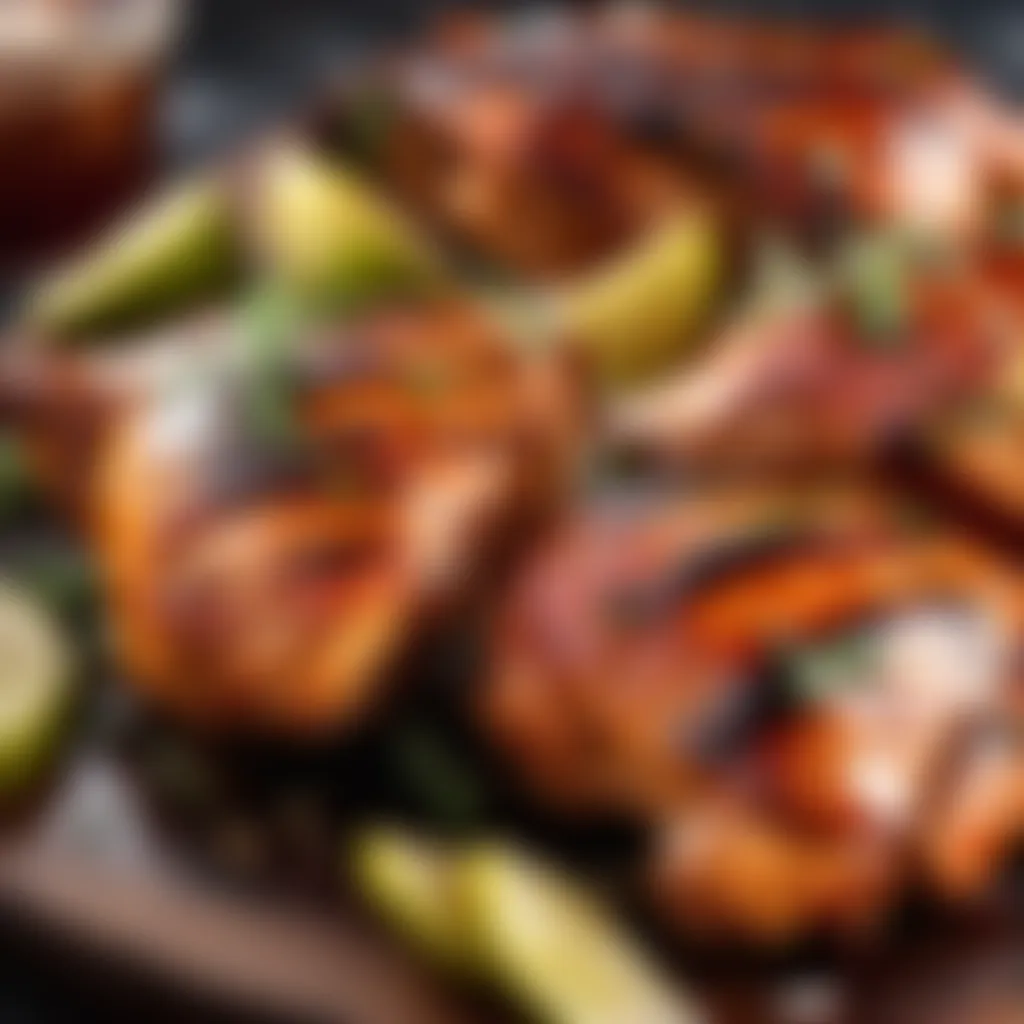Master the Art of BBQ Chicken Marinade


Intro
When it comes to summer cookouts or weekend barbecues, BBQ chicken is often the star of the show. There's just something magical about that smoky aroma wafting through the air and the sizzle of chicken grilling on a hot flame. But let's be honest, the secret to truly unforgettable BBQ chicken lies in the marinade. A good marinade is like a magic potion; it infuses the chicken with flavor, making each bite tender and irresistible.
In this guide, we will navigate through the essentials of crafting the ideal BBQ chicken marinade. Whether you're an experienced cook or just starting out in the kitchen, these steps are straightforward and manageable. You'll learn about crucial ingredients, preparation techniques, and cooking processes that not only enhance taste but also leave a lasting impression on your guests.
So, roll up your sleeves and get ready to elevate your culinary game by creating the perfect BBQ chicken marinade that will have everyone asking for seconds! Let's start by gathering our ingredients.
Preamble to BBQ Marinades
Understanding BBQ marinades is a game changer for anyone who wants to elevate their grilling experience. Marinades can make or break the meal; they are not just an optional enhancement but essential for achieving that depth of flavor people crave. A well-crafted marinade penetrates the meat, tenderizing and infusing it with robust flavors, ensuring each bite is a delightful explosion of taste. Moreover, the advantages of using marinades extend beyond flavor.
The Role of Marinades in Cooking
A marinade serves multiple purposes in cooking:
- Flavor Enhancement: The primary goal of marinading is to boost the flavors of the chicken. The blend of spices, herbs, and acids in the marinade work harmoniously to create a savory experience.
- Texture Improvement: The acids in marinades, such as vinegar or citrus juice, break down proteins in the meat, making it tender and juicy. Think of it as giving your chicken a spa day before it hits the grill!
- Moisture Retention: Marinades contribute to moisture retention during the cooking process. When chicken is submerged in a mix, it absorbs some of that liquid, leading to a less likely chance of dryness. You certainly don’t want to bite into rubbery, dry chicken!
From marinades that whisper subtle hints of flavor to those that boldly proclaim their presence, the possibilities are as vast as your culinary ambition. It's this versatility that makes marinades indispensable in the kitchen.
Why Choose Chicken for BBQ
When it comes to BBQ, chicken stands out as a prime choice for several reasons:
- Versatility: Chicken can take on a wide variety of flavors. Whether you're in the mood for smoky barbecue, zesty citrus, or even something sweet, chicken adapts beautifully. It’s like the blank canvas waiting for your artistic touch.
- Healthier Option: In comparison to red meats, chicken is often considered a healthier protein choice. It’s generally lower in fat and calories, making it a popular choice amongst those looking to maintain a balanced diet.
- Quick Cooking: Chicken grills relatively quickly, making it an ideal choice for a weeknight meal or spontaneous gatherings. No one wants to spend all day cooking when that backyard party is just around the corner!
- Family-Friendly: Lastly, chicken tends to be a crowd pleaser. Even picky eaters find something to love when chicken's on the menu. It's simple to season, and even easier to cook, making it an ideal dinner option for families.
Grilling chicken brings a sense of comfort, warmth, and joy. The aromas wafting through the air signal good times, and with the right marinade, you can ensure your BBQ chicken is the talk of the dinner table.
Essential Components of an Effective Marinade
Creating the perfect BBQ chicken marinade isn't just about tossing a few ingredients together. It’s an art that requires knowledge of the essential components that work in synergy to enhance flavor and ensure tenderness. Understanding these elements is critical for making an impact at your next grill session.
Acid: A Key Ingredient
Types of acids to consider
When thinking about acids in marinades, it’s like having a toolbox at your disposal. Common choices include vinegar, citrus juice, and yogurt. Each type of acid brings its own character to the dish. For instance, vinegar, particularly apple cider or balsamic, adds a delightful tang that balances the richness of chicken and helps cut through heavier flavors. Citrus juices like lemon or lime provide a fresh, lively zing while also contributing to the marinade’s overall brightness.
Unique feature? The sharpness of these acids not only adds flavor; they also play a pivotal role in the meat’s chemistry.
But beware, using too much acid can lead to an unpleasant outcome. If it sits too long, chicken can become mushy, losing its desirable texture.
How acid affects chicken texture
The effect of acid on chicken texture is fascinating. When chicken is marinated in an acidic component, the proteins start to break down through a process called denaturation. This reaction occurs at a molecular level and makes the meat not just tender but also more permeable to flavor.
Softening the muscle fibers allows the flavors to seep right in. This means that each bite will explode with the rich, robust tastes of the marinade.
However, timing is everything. Too long in the acid bath can shift the texture from tender to soggy, so it’s essential to find that sweet spot to maximize flavor without compromising quality.
Oils for Moisture and Flavor


Choosing the right oil
Selecting the right oil is like picking the right brush for a masterpiece. Olive oil, known for its fruity flavor, works wonders with herbs and spices, creating a well-rounded base for your marinade. Meanwhile, canola oil is a neutral option, which allows the other ingredients to shine without overpowering them.
The desirable aspect here is that oils keep the chicken moist during grilling, helping to prevent dryness—a common pitfall when cooking poultry.
With oils, though, it’s also vital to control the quantities. Too much oil can lead to an overly greasy finish, while too little can result in dry meat.
The role of oil in flavor infusion
Oil not only enhances moisture but also acts as a solvent for fat-soluble flavors, which encompasses a variety of herbs and spices. When heated, these flavors are released and absorbed into the meat, leading to a more profound depth of taste.
This unique feature allows oils to capture and carry flavor compounds, ensuring that every bite of chicken is savory and aromatic. The right balance is key; an ideal marinade has enough oil to facilitate flavor absorption without making the dish feel oily or slimy.
Herbs and Spices: Crafting Complexity
Common herbs to use
Fresh or dried herbs bring a fragrant quality to marinades. Classic choices include parsley, thyme, and rosemary. Each brings a unique touch: parsley adds freshness, while rosemary imparts woodsy notes. The sheer variety of herbs available means you can tailor flavors to suit your preference. They are like the secret ingredients that can make or break a dish.
Using herbs in moderation allows them to enhance without overshadowing the chicken's natural taste, striking a balance that keeps the dish authentic.
Spice blends that enhance taste
Then, let’s talk about spices. Blends like cumin, paprika, and cayenne pepper can elevate your marinade from simple to sensational. These spices add warmth and depth, often transforming a fairly standard dish into a culinary experience.
The unique advantage here is versatility. By using blended spices, you can create a spectrum of flavors—from smoky and sweet to hot and zesty.
It’s important, however, to experiment wisely with spice levels. A little can go a long way, so start small, taste, and adjust to your liking.
Remember, creating the perfect BBQ chicken marinade is about experimentation and finding what suits your taste best!
Crafting the Perfect BBQ Chicken Marinade
When it comes to elevating the taste of BBQ chicken, crafting the perfect marinade is nothing short of crucial. A well-thought-out marinade not only allows flavors to penetrate the meat but also helps in achieving that juicy, tender texture that everyone craves. In essence, it transforms simple chicken into a dish that can steal the show at any gathering.
Recommended Ingredients List
To create a marinade that truly delights, you'll want to gather a few key ingredients that harmonize beautifully. Here’s a snapshot of essentials:
- Acidic Component: This could be lime juice, vinegar, or yogurt. They help tenderize the meat.
- Oil: Olive oil or avocado oil is recommended, adding moisture and flavor.
- Herbs and Spices: Think garlic, rosemary, cumin, and smoked paprika. They add layers of flavor.
- Sweet Element: Honey or brown sugar can caramelize on the grill, providing depth.
- Salt and Pepper: Don’t skimp on the basics. They enhance all other flavors.
Step-by-Step Preparation Guide
Mixing the marinade
Mixing the marinade is the stage where the magic begins. Carefully combining all the ingredients in a bowl, or even a blender, ensures an even distribution of flavors. The key characteristic of this process lies not just in thorough mixing but in balancing the various components. Too much acid can overpower the chicken, while not enough may leave it tasting flat.
It's often a good choice to taste as you go; a little adjustment in sweetness or acidity can transform the overall profile. The flexibility of this step allows for personal tweaks based on preference, making it a beneficial aspect of the marinade preparation. One might find that blending different herbs could unveil an original flavor combination that suits the occasion perfectly.
Marinating techniques
When it comes to marinating techniques, the method can significantly enhance the chicken's flavor. One widely practiced technique is to place the chicken and marinade in a zip-top bag. This allows for even coating and easy flipping for thorough marination. Another method could be to utilize a glass dish; however, care should be taken to ensure the chicken is submerged fully.


A crucial point to remember is that spreading the marinade evenly across the chicken ensures every inch of the meat is infused with flavor. It's a popular choice among seasoned cooks due to its effectiveness. However, it’s important to note that over-marinating, especially with acidic ingredients, can lead to a mushy texture, which is something to avoid.
Timing considerations
Timing plays a decisive role in marinating chicken. For optimal flavor absorption, it's commonly recommended to let the chicken soak for at least 30 minutes. However, for those focusing on depth, marinating overnight can work wonders. The unique feature here is that the longer the chicken is left in contact with the marinade, the more pronounced the flavors become. But balance is key; too long can result in textural issues.
In short, understanding how timing impacts the marinating process is like knowing when to pop the cork on a fine wine. Letting it breathe too long can change the outcome dramatically. So whether you're short on time or planning ahead, gauging the well-timed soak is an essential skill.
Enhancing Flavor with Variations in Marinades
When it comes to BBQ chicken, utilizing a marinade can elevate the flavors and make an unforgettable impression. Variations in marinades introduce a spectrum of tastes that cater to diverse preferences. They allow cooks to create unique flavor profiles, ensuring that every meal can be a little different. Experimenting with marinades not only enriches the dish but also offers a fun approach to cooking. By incorporating global inspirations and personal elements, home chefs can turn a simple chicken meal into a culinary adventure.
Global Inspirations: Different Cuisines
Asian-inspired marinades
Asian-inspired marinades often feature a blend of soy sauce, ginger, and garlic. These ingredients bring a depth of umami and a hint of spice, contributing to the overall flavor balance. The key characteristic of these marinades is their ability to harmonize sweetness and saltiness. This makes them a popular choice for BBQ chicken, as they create a delicious glaze during the grilling process.
Unique to Asian variants is the use of ingredients like sesame oil or rice vinegar, introducing nutty and tangy notes that enhance the dish. While these flavors can be exceptionally tasty, beginners might find the distinct tastes overwhelming. However, with practice, these marinades can turn an ordinary chicken dinner into something special.
Latin flavors to try
Latin flavors often rely on zesty ingredients like lime juice, cilantro, and chili powder. This combination produces a bright and bold taste that pairs beautifully with grilled chicken. The key characteristic here revolves around a freshness that reinvigorates the palate. The vibrant nature of these marinades makes them beneficial in the BBQ scene, providing a refreshing twist.
A unique feature of Latin flavors is their adaptability. You can easily switch up the herbs and spices based on what's available, whether fresh or dried. The downside might be the heat levels, as some Latin marinades can pack a punch. However, this versatility allows for a balance catering to both spice lovers and those preferring milder options.
Creating Unique Blends
Using seasonal ingredients
Incorporating seasonal ingredients into your marinades is an excellent way to ensure freshness and flavor. Using seasonal ingredients means you get the best produce available, whether it’s ripe summer strawberries or fragrant autumn herbs. This practice aligns beautifully with the concept of farm-to-table cooking, creating a connection between the food and its origins.
The inherent advantage here is that seasonal ingredients offer peak flavor, which can elevate the overall marinade quality. It also encourages creativity; each season brings a new set of flavors to explore. However, this approach can be limiting if chefs are not fully aware of what's in season.
Experimenting with sweet vs. savory balances
Finding a dance between sweet and savory is essential in crafting marinated recipes that tantalize the taste buds. Experimenting with sweet vs. savory balances allows cooks to customize their marinades, resulting in a more personalized dish. For example, consider adding honey or maple syrup alongside soy sauce and garlic. This creates delectable layers of flavor by meldng sweet notes with savory elements.
The unique feature of balancing these two taste profiles contributes to an exciting dining experience. However, caution must be taken, as too much sweetness can overpower the savory components. Thus, careful measuring and tasting throughout the cooking process can help align the flavors to achieve perfection.
By incorporating different influences and elements, every cook can find a marinade that suits their comfort and taste!
Exploring variations in marinades not only enriches the BBQ chicken experience but creates opportunities for culinary adventures at home.
Techniques for Grilling BBQ Chicken
Grilling BBQ chicken is more than just throwing pieces of meat on a hot surface. It’s a nuanced art that requires knowing the right techniques to achieve tender, juicy results. In this section, we’ll explore the two primary grilling methods and tips to avoid dryness.
Grilling Methods: Direct vs. Indirect Heat
Using the right grilling method can make a world of difference in the outcome of your BBQ chicken.
- Direct Heat Grilling
- Indirect Heat Grilling


- This is when you cook the chicken directly over the flame. It’s quicker and yields a lovely char, which adds a nice texture and flavor. Ideal for smaller cuts like wings or thighs that cook fast.
- Be aware though; if your heat is too high, you risk burning the outside while leaving the inside undercooked. To get a perfect char, keep an eye on it and turn often.
- This method involves placing the chicken away from the direct flame, which allows for slower cooking. It’s akin to braising the meat, resulting in tender meat that has time to soak up flavor.
- Perfect for larger pieces like whole chicken or breasts that could be done but remain stiff and dry with direct heat alone. This technique ensures that your chicken cooks evenly without any burnt spots.
Choosing between these methods depends on the result you desire. Mixing both methods can yield satisfying results. Start with direct heat to sear, then move to indirect to finish cooking the chicken thoroughly.
Avoiding Dryness: Tips for Perfect Cooking
Nobody enjoys biting into a piece of chicken only to encounter dryness. There are several strategies to keep your BBQ chicken moist and delectable:
- Choose the Right Cuts: Thighs and drumsticks tend to retain more moisture than breasts, making them a wise choice if you're worried about dryness.
- Marinate Generously: A well-crafted marinade adds flavor and moisture. Don’t rush the marinating process. Aim for at least a few hours, if not overnight for maximum absorption.
- Monitor Internal Temperature: Using a meat thermometer is crucial. Aim for a temperature of 165°F (75°C) in the thickest part of the chicken. This way, you know it's cooked through, but not overdone.
- Let it Rest: Once done grilling, let your chicken sit for a few minutes. This allows the juices to redistribute, ensuring every bite remains juicy.
By combining the right grilling methods with these tips, you can create BBQ chicken that impresses everyone at the table.
Remember: The key to great BBQ chicken lies in balancing techniques with the particular properties of the protein you're using. Pay attention to how each method impacts the flavors and juiciness of your dish.
Storing and Using Leftover Marinade
When crafting that mouthwatering BBQ chicken marinade, it’s natural to have a bit left over. Rather than tossing it out, understanding how to store and use leftover marinade can save both time and resources, adding value to your culinary endeavors. Not only does this practice minimize waste, but it also allows for added flavor in future meals.
Safety Considerations
Before you think of how to use that leftover liquid gold, it's vital to keep in mind some safety protocols. First off, any marinade that has been in contact with raw poultry can carry harmful bacteria. Here's what you need to remember:
- Refrigeration: Always store the leftover marinade in the refrigerator if you plan to use it within a few days.
- Air-tight containers: Use a well-sealed container to avoid any cross-contamination with other foods in your fridge.
- Time limits: Aim to use the leftover marinade within 48 hours. This prevents any safety issues that might arise from prolonged storage.
- Cooking: If you plan to use the leftover marinade directly on food, be sure to boil it first. This step ensures that any harmful bacteria are killed off.
Not following these guidelines can take a delicious meal and turn it into a health concern, so always err on the side of caution. In the kitchen, a little vigilance goes a long way!
Creative Uses for Leftovers
Once you’ve ensured that your marinade is safely stored, let your creativity shine through its uses. Here are some imaginative ideas to make the most of those flavorful remnants:
- Basting Sauce: Use the marinade as a basting sauce while grilling or roasting other meats. Brush it on frequently to enhance the flavors without creating waste.
- Marinade for Vegetables: Toss some vegetables, like bell peppers and zucchini, into the leftover marinade for a quick infusion of flavor. Grilling these seasoned veggies alongside your chicken can create a harmonious plate.
- Flavoring Rice or Quinoa: When cooking grains, adding a bit of leftover marinade to the cooking water can bring depth and taste to your side dish.
- Soups and Stews: Stirring in leftover marinade adds a robust taste to soups or stews, enriching the broth with its earlier nuances.
"Even a splash of leftover marinade can turn the ordinary into the extraordinary."
- Dressings and Dips: Blend it into a salad dressing for a unexpected twist or mix with mayonnaise for a zesty dipping sauce.
No longer do the remnants have to sit condemn in your fridge! With a bit of cleverness, you can enhance your cooking, reduce wastage, and keep that BBQ flavor alive.
End: The Art of Marinading
In the bustling world of culinary creation, marinading stands as both an art and a science, especially when it comes to BBQ chicken. This process not only intensifies flavors but also transforms a simple piece of meat into something memorable. The importance of mastering marinades can’t be overstated; it brings depth, richness, and soul to each grilled bite.
Final Thoughts on Flavor Development
Developing a robust flavor profile in your marinade hinges on understanding the synergy of its components. The combination of acid, oil, herbs, and spices creates a multi-layered taste experience that captivates the palate. For instance, acidity from ingredients like lemon juice or vinegar tenderizes the chicken, allowing it to soak up flavors effectively.
Consider a scenario where a citrus-based marinade is used. This not only infuses freshness but can brighten up the chicken, giving it a delightful zing. As the chicken absorbs the marinade, the taste evolves, making every bite a journey of flavor. Balancing these elements is crucial; too much salt can overpower, while too little acid may fail to sufficiently penetrate the meat.
"A great marinade does not just add flavor; it brings harmony that enhances the natural qualities of the chicken."
Inviting Experimentation and Personalization
An essential aspect of the crafting process is the element of personal touch. Cooking, after all, is expression. Don't hesitate to experiment with various ingredients or flavor profiles that resonate with your taste buds. For instance, if you enjoyed spicy dishes, consider incorporating chili flakes or sriracha into your marinade. Alternatively, for a touch of sweetness, honey or brown sugar could create a delightful contrast.
Following your creativity can lead to unexpected flavor fusions. Seasonal ingredients also offer inspiration; fresh herbs like basil in summer or warming spices like cinnamon in winter can tailer the experience to fit the moment. Additionally, multiplier aspects like marinating duration can yield varying results—experiment with short bursts versus those long soaks overnight, and see what ticks the boxes for you.
In the grand scheme of BBQ chicken, every grilled masterpiece can tell a story of flavors. Invite your family and friends along for the ride of exploration, as you personalize recipes to reflect your culinary adventures, allowing the art of marinading to not only elevate your grilling game but to forge cherished memories around the dining table.







